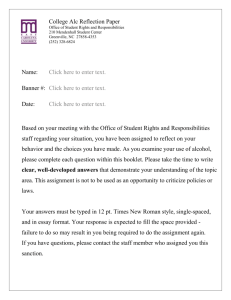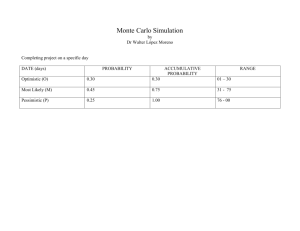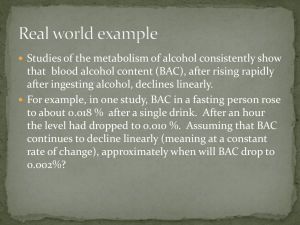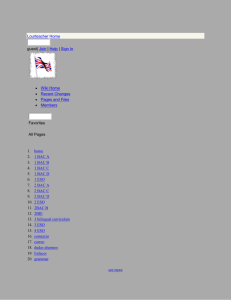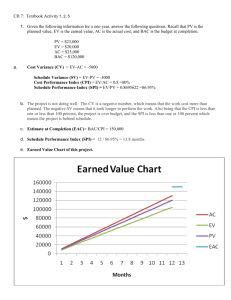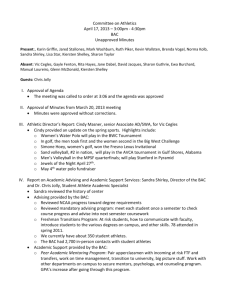Metagenomic Investigation of Microorganisms exposed
advertisement
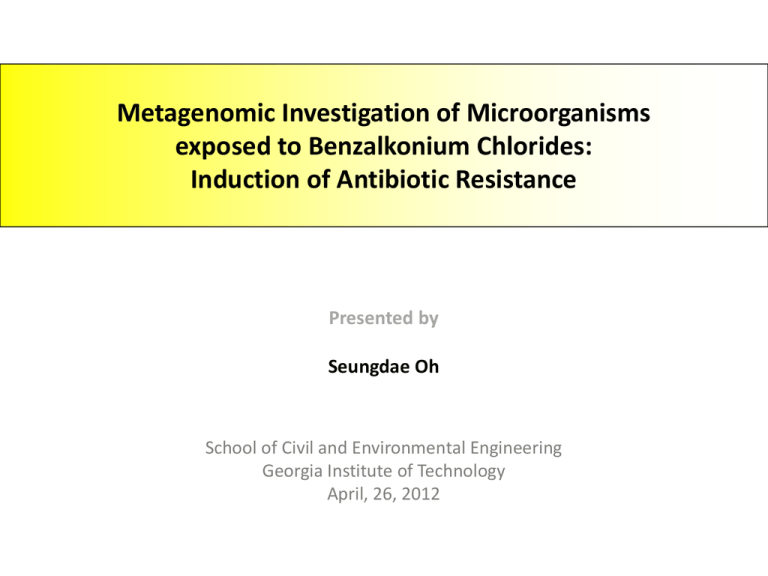
Metagenomic Investigation of Microorganisms exposed to Benzalkonium Chlorides: Induction of Antibiotic Resistance Presented by Seungdae Oh School of Civil and Environmental Engineering Georgia Institute of Technology April, 26, 2012 Antibiotic resistance S. aureus - Affect anyone P. aeruginosa Entercocci - Mortality - Hamper health care systems - Spread rapidly - New antibiotics are drying up. No action today, no cure tomorrow. (IDSA, 2004) 2 Benzalkonium chlorides (BAC) -Disinfectant, cationic surfactant, phase transfer agents Cl− R N - Cell membrane-active agents : Membrane perturbation : Inhibition of respiratory functions : Osmotic/oxidative stress BAC (R=C8H17 - C18H37) - BAC resistance mechanisms : Cell envelope modification : Efflux pumps : Oxidative stress defense systems BAC resistance mechanisms also may work against antibiotics. 3 Development of microbial communities Aerobic fed-batch reactor Calcasieu River Sediment, LA - 14 days retention time at RT - >2 years operation Substrates http://www.csert.com/emer gency.asp : Dextrin/Peptone (2,200 mg/L COD) : BAC (140 mg/L COD) Inoculum DPB :Dextrin/Peptone + BAC DP: Dextrin/Peptone DPB :Dextrin/Peptone + BAC B :BAC 4 Minimum Inhibitory Concentrations (MICs, mg/L) Antimicrobials DP DPB B BAC 100 250 460 Tetracycline <0.5 250 95 Ciprofloxacin <0.5 16 18 (Tandukar et al., unpublished) BAC exposure induces antibiotic resistance. 5 Metagenomics for the entire microbes Samples Microbial community Whole genomic DNA Metabolism Phylogeny Bioinformatics Evolution ATGCATCCA ATCCATGCA Assembly Gene prediction 6 Data preparation Assembly Gene prediction Functional characterization Culture DP DPB B Gene # 32,053 85,94 2 62,365 100 times of bootstrap to sample 5000 genes 100 subsets 5000 sampled genes normalized by the size and categorized into 11,912 functional categories Function DP-1 … DP-100 F-1 0.1 … 0.08 F-2 0.08 . 0.07 . . . . F-11,912 0.05 … 0.07 equal Function DPB-1 … DPB-100 F-1 0.09 … 0.07 0.3 . 0.33 . . . 0.04 … 0.08 F-2 Significantly different? . F-11,912 equal Before hypothesis testing, what the distributions in each function look like should be checked (normal or not normal?). 7 Normality test Normal Not normal 8% D P Jarque-Bera tests for distributions in each function -Null hypothesis: Data come from a normal distribution with unknown mean and variance. 6% ~7% of distributions are not normally distributed. DPB Not allowed to use Student’s T-test or F-test 6% B 8 Non-parametric tests Distribution free tests, which do not rely on assumptions that the data are drawn from a given probability distribution (e.g., normal distribution). -Ansari-Bradley test -Mann-Whitney test -Kolmogorov-Smirnov (KS) test Null hypothesis: The samples are drawn from the same distributions. Quantifies a distance between the empirical distributions of two samples. KS test is not sensitive to the underlying distribution and adequate for metagenomic community comparison (Wang et al., 2011). 9 Gene functions that reject the null hypothesis # functions There are ~1000 functions where there is a statistical evidence that two distributions (control vs. DPB or B) are not identical (P < 10-4). Some of the functions may relate to antimicrobial resistance mechanisms. 10 Gene functions enriched in DPB and B communities Drug inactivation Efflux pumps Membrane stability Oxidative stress defense Log2 (DPB/DP or B/DP) BAC exposure enriches antimicrobial resistance capabilities.11 Questions? 12 QAC: agents of spreading antibiotic resistance? Biocides induce antibiotic resistance. (American Academy of Microbiology report, 2009; Karatzas et al., 2008; Loughlin et al., 2002; Mc Cay et al., 2010; Romanova et al., 2006; Tattawasart et al., 1999) vs. Biocide-resistant bacteria are not necessarily more resistant to antibiotics than biocide-sensitive bacteria. (Anderson et al., 1997; Cole et al., 2003; Kucken et al., 2000; Lear et al., 2006; Sidhu et al., 2001a; Stecchini et al., 1992) Conclusive evidence is lacking. 13 Research questions 1. Do QAC exposure induce antibiotic resistance? 2. What mechanisms enable the biocide-induced antibiotic resistance? 14
